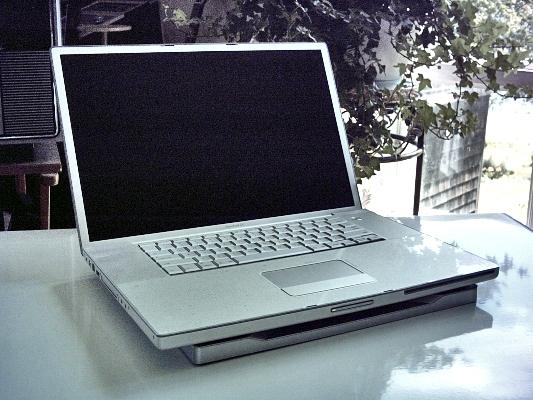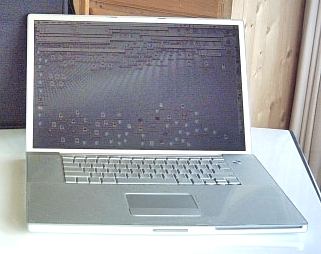Low-End High-End ‘Books - Plus 'Book Mystique Mailbag
by Charles W. Moore
A former neighbor of mine was a big fan of used Cadillacs - the great big rear-wheel-drive ones like the Coupe de Ville and Fleetwood Brougham. A retired clergyman, he took some razzing in the church parking lot; comments like “It must be nice to be able to afford a luxury car.” The irony, he observed, was that such commentators would then often drive away in a late model compact or subcompact “that cost two or three times what I paid for this Caddy.” And, he added, it would take a lot more driving than he did to make up the difference in gas mileage.
A sort of analogical dynamic applies to computers, although only roughly. As regular readers of this column know, my current production Mac is a 1.33 GHz 17-inch PowerBook that I purchased as an Apple Certified Refurbished Unit last February. At the time, a possible alternative in a new machine would have been the 1.42 GHz 14” iBook, which was selling for a couple of hundred dollars less than the refurb BigAl, so the used Caddy versus new cheap car analogy doesn’t really work in this context, but I still think I have a more desirable machine with the big, old 17-incher, which in this instance, was virtually new anyway, with no evidence of it never having been used.

In real-world use, the iBook’s slight edge in clock speed should be more than compensated for by the PowerBook’s faster system bus, better graphics processor, and twice the amount of video RAM. The iBook’s 14-inch 1024 x 768 resolution display is mediocre compared with the PowerBook’s 17-inch 1440 x 900 widescreen. The PowerBook keyboard is light-years better than the one in the iBook, and backlit as a bonus. Other stuff the PowerBook has that the iBook doesn’t are a PC card slot, analog sound in, Gigabit Ethernet, and FireWire 800. It’s also a PowerBook, with the cachet, and the deluxe fit and finished that the name implies, and that’s a context in which the used - er - “previously owned” Cadillac analogy does hold up. It’s the top of the line.
However, now with the MacIntel era closing on the end of its third quarter, the low-end, high-end waters have muddied considerably. The base MacBook, selling for $1,099, is not just an extremely fast notebook computer. It’s an extremely fast computer, period, and comes with a very complete feature set wrapped in an extremely attractive form factor design. Frankly, it’s hard to make a case for buying any other portable in the general price range.

Refurbished 1.33 GHz 17-inch PowerBooks like mine are currently selling for $1300-$1400, but unless support for Classic Mode is a top priority, I would recommend saving a couple or three hundred bucks and going with a new MacBook. Performance-wise you’re talking a whole different dimension, and the MacBook’s 13.3 inch, 1280 x 800 widescreen, while not quite as expansive and high resolution as the 17” PowerBook’s display, still offers a very nice amount of working area. You do, however, still have to get along without a PC Card slot, FireWire 800, analog sound in, and the backlit keyboard, although the MacBook’s keyboard is getting lots of favorable reviews for its solid, positive feel.
As for that 14” iBook, Apple is pricing Certified Refurbished units at $999, although why in the world anyone would buy one at that price when they can get a brand new MacBook for a hundred bucks more or a refurbished one at exactly the same price is beyond me.
Another low-end “luxury” ‘Book to consider is the 12-inch PowerBook, especially in its penultimate 1.33 GHz and ultimate 1.5 GHz iterations, which we can analogize with the Mercedes-Benz C-Class or BMW 3-series sport-luxury compacts. The last Apple Computer to bear the PowerBook name, and a worthy bearer of it, the little 12-incher is holding its value quite well, partly because the MacBook, which is nearly as big and heavy as the erstwhile full-sized Titanium PowerBook, doesn’t really fill its shoes as a subnotebook. The late-revision 12-inch PowerBooks are still being offered at prices of $1,000 and up, but if you can find one for $900 or less and the little AlBook’s trim size in light weight fit your needs better than the MacBook’s raw power and larger screen, it bears consideration as an alternative.
Thus far, I’ve only discussed machines at the polar ends of the size spectrum, but if middle-of-the-road is more your cup of tea, the Certified Refurbished 1.83 GHz and 2.0 GHz MacBook Pros Apple is selling for $1,549 and $1,699 respectively represent a substantial discount off the $1,999 they sold new for less than eight months ago. The operative conundrum with these models is whether they have the second generation logic boards that Apple quietly incorporated in the 15 inch MacBook Pro after a couple or three months of production. Tip: I *think* that if you specify a glossy display 2.0 GHz unit, you should be assured of getting the second generation logic board.
There are also, of course, refurbished 15-inch aluminum PowerBooks available, and the last revision 1.67 GHz model with its high resolution (the same 1440 x 900 as my 1.33 GHz 17-inch PowerBook) and standard backlit keyboard Is a particularly nice piece piece of work, currently offered by Apple for $1,349 when supplies are available.
Then there is the king-of-the-hill 2.16 GHz 17-inch MacBook Pro, the first refurbs. of which began to be available last month at $2,399, which I would find tempting as opposed to a new 15-inch MacBook Pro of the same clock speed selling for $100 more, given that the 17-incher features the larger screen, plus FireWire 800, three rather than two USB ports, a 8x dual-layer SuperDrive instead of a 4x unit, and whose less cramped internal components should run a bit cooler.
You’ll also have the current Cadillac of notebooks (or Mercedes S-Class if you prefer) for $200 less than the price of a 400 MHz TiBook five years ago.
DEVONthink Pro article
From Jim
Dear Mr. Moore,
I just read your excellent article at PBCentral. I was wondering if you might answer a couple ?s as to how this program compares to Sticky Brain and Bojimbo. I’m a counselor in an elem. school on an American military base in Germany.
I do some video productions and have had a digital video club after school for about 4 years. My computer skills are just average but I am finding that I need some type of program to help me organize information for lessons for guidance where I can combine several types of formats or at least group things/info that supports an idea I’m trying to communicate. These are often articles from a web page or a video clip or photo. I don’t really know what’s the best way to save web information - and then find it again easily. I have saved just the link to a page (but sometimes those links don’t last) other times I’ve copies the text or saved as a pdf. I’d like to save the web page as it presents on the browser and then be able to search it by content or title later. Your advice/comments would be appreciated if you have the time.
Sincerely,
Jim
Hi Jim;
I’ve not used the two programs you mention, but I have reviewed Boswell and KIT, which are both dofferent approaches to a similar end (but neither support Web surfing). I like them both, but I have to say I prefer DEVONthink Pro, which is what I use myself.
All of the DEVON apps. are available as free demo downloads, so it’s easy to check them out for yourself. If the price of entry for DEVONthink Pro seems a bit steep for yoru budget, DEVONnote is a sort of “lite” (but still amazingly powerful) version of the same technology.
Regarding your query about saving Web pages, there are three commands in DEVONthink Pro that would address your needs:
• Capture Page: Captures the HTML code of the page and saves it as a new HTML document.
• Capture Webarchive: Captures the page as a Web archive file including all necessary images for offline viewing and archival.
• Update Webarchive: Updates the contents of a Web archive file with the live version on the Internet (only available in Web archives).
These documents will be archived in the DTP database and searchable.
Charles
Find the best deal on a new MacBook at PCPrices/Mac.